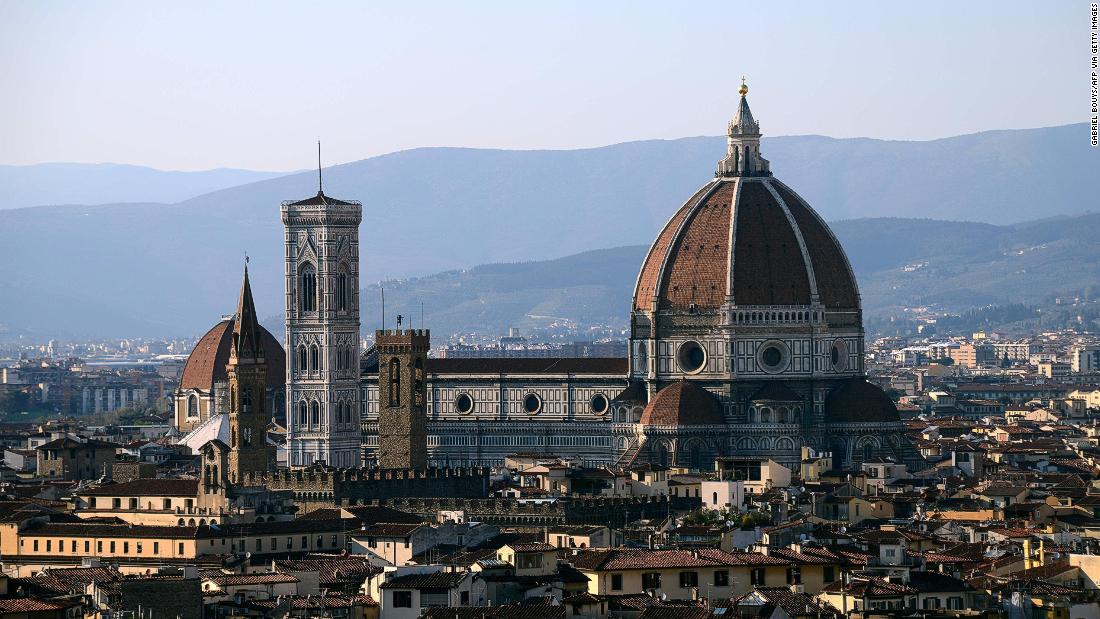(CNN) — As the tourists head back to Italy, one of the cities that has suffered most at the hands of tourism is fighting back.
In a bid to avoid overcrowding during the pandemic, authorities in Florence have announced that people will be banned from the city’s most popular nightlife areas, unless they’ve been eating or drinking in the area.
And in a bid to tackle the side effects of tourism, one of the city’s most important voices has called for a tax on street food stalls.
Mayor of Florence Dario Nardella has signed an ordinance banning people from wandering around popular areas on Thursday, Friday and Saturday evenings until further notice.
Access to six areas of the historic city center — including the popular nightlife area of Santo Spirito — is not allowed from 9 p.m. to 6 a.m., unless people are using the bars and restaurants there.
Other bans include the central areas Piazza Strozzi, Santa Croce and Piazza S.S. Annunziata. All are places where people like to congregate in the evenings on the steps of the famous churches and palaces.
Eating or drinking on the steps of the basilica of Santo Spirito is banned 24/7, as well.
Anyone breaking the rules will be fined between €400 and €1,000 ($475 – $1,185).
The rules will be in place until the end of the pandemic.
“The squares are public — if people are behaving badly you need to make them go away, you don’t say that you can only access these places with a receipt from a bar — it’s saying you can only get access if you pay,” she said.
“It’s fine to say you can’t bring a beer along and chuck it on the ground, but limiting access — no, it’s not right.”
The call for a ‘sandwich tax’

Tourists eating and drinking in the courtyard around the Uffizi are ruining the historic building, says director Eike Schmidt.
Alberto Pizzoli/AFP via Getty Images
“Bans [on eating] and fines [for littering] have proved mostly inadequate at tackling the phenomenon,” Schmidt told CNN. The open courtyard around the Uffizi is ringed by inbuilt benches of highly absorbent “pietra serena” stone, so the problem is not just litter, he says — food and drink are ruining the stone that’s been there since the Renaissance period.
“Even now, the benches and steps of the Uffizi and the Loggia dei Lanzi [which looks onto the main square] are full of people eating and drinking. The result is oil and sauce on the stone, bits of paper, food leftovers and stains from soft drinks everywhere.
“The stone absorbs it all and gets damaged over time, so to protect it we have to be cleaning it continuously.
“Having stallholders take responsibility through a small contribution could be a concrete way of tackling it.”
Street food sellers are different from restauranteurs, said Schmidt, because the latter have premises where clients can eat, that they clean afterwards. Whereas with street food, “of course it’s a legitimate business, but they take the money for the sale of the product, but essentially flush the consequences — litter, oil, ketchup, sauce that drips on the ground or the stone — on the citizens. So we need to balance the situation.”
An ‘absurd’ idea
His proposal has been met with delight by some locals. “The situation is terrible, and needs to be managed,” said Grechi, who would like either to see eating and drinking banned in the area, or to change the urban planning to ban clusters of street food stalls: “It means that anyone who doesn’t want to sit down for a meal goes to the same places,” she said.
But those in the business have reacted with fury.
“It’s not the moment to think about new taxes after 18 months of a pandemic,” he told CNN, adding that about a third of his members have either folded in the pandemic, or are close to folding.
“The hospitality sector is one of the most affected industries — they’re just starting to see light at the end of the tunnel, and here comes this idea of a sandwich tax.”
What’s more, he said, “Florence was born on street food — we have a street food culture,” referring to lampredotto, the local delicacy made from the fourth stomach of a cow, usually served in a sandwich.
Instead, he said the city should be putting the onus on the tourists making the mess.
“We need to fine people who don’t behave well — who litter, who make the city dirty,” he said.
“We want tourists, but behavior needs to be civil. Florence is everyone’s heritage, but tourists need to respect it enough to leave it clean.”
A question of quality
“The problem definitely exists, so we need to take action that can better ‘hit-and-run’ tourism, but I haven’t understood how the tax would be applied, and who to,” he told CNN.
The issue is not just sandwiches, he said.
“Ice cream, pizza — it’s all out of control now, especially if you’re talking about the quality of what’s on offer.
“To make something of good quality has a cost — from the product itself to the staff, hygiene and cleaning of the sales point. So when something costs so little, we should be asking questions.
“And let’s not forget that often people bring their own food in a backpack and leave the waste everywhere.”
But Schmidt insisted: “The situation that’s on its way back is already penalizing various kinds of business — but most of all it’s damaging the image of the whole city, and that hurts everyone.”
